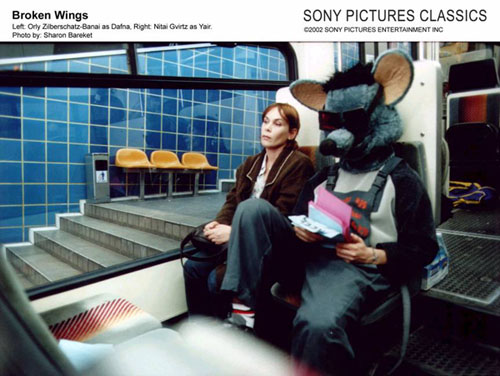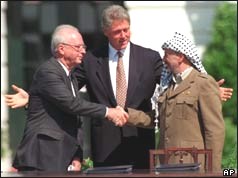BROKEN
WINGS SOARS!

"Who says life in Haifa ends at 10 PM?"
BROKEN WINGS, an internationally award-winning Israeli film, has just opened in theaters here in the United States. However, even though this film is “new” to us, it was actually made in 2000. This is an enormously important fact that affects what you should and should not expect to see on screen. Specifically, this film was made before what has come to be called the Second Intifada, before the implosion of the Palestinian Authority, before the controversy about the barrier wall.
BROKEN WINGS has its genesis in the period immediately following the assassination of Yitzhak Rabin.
Those of us who were alive at the time remember exactly where we were and what we were doing when we learned that President Kennedy had been shot. Younger people know about the volatile aftermath now known as “the Sixties” – a decade of upheaval resulting in battles between old and young, black and white, men and women, Liberals and Conservatives. Many changes, great and small, can be traced back to one specific act on a fateful day. This is the knowledge you must bring into the theater with you when you go to see
BROKEN WINGS.
A story about an ordinary family trying to live a normal life,
BROKEN WINGS is built of scenes which artfully combine claustrophobic family love, teenage angst, painful self-discovery, and bittersweet humor. It zeroes in on the Jewish funnybone, achieving its best effects through irony and wordplay.
A son has lost his father. He is too angry and confused to return to school, so he gets a job distributing flyers for a nightclub. As he roams his hometown subway system in a mouse costume, this walking billboard demands to know: “Who says life in Haifa ends at 10 PM?” (How to unpack a joke? Life in Israel is always lived on the edge, so maybe life is about to end in five minutes. On the other hand, since Haifa’s not exactly known as a swinging town, maybe life ended yesterday and nobody noticed?)
Yair, the 16 year old mouse, has three siblings, Maya (17), Ido (11), and Bahr (6). Their mother, Dafna, is in her early 40s. She’s a midwife at a Haifa hospital, and her job, by its nature, requires her to work long, irregular hours across shifts. (She brings new life into the world, but babies don’t keep to anyone’s schedule save their own.) So the members of this family must absorb their great loss even while meeting everyday obligations that would stress even the strongest of bonds.
Director/Screenwriter Nir Bergman weaves an intricate web of relationships that allows all five characters to develop their unique personalities. Maya, a talented songwriter, has a budding musical career, a mentor, and a boyfriend. Yair has a guidance counselor and an ex-girlfriend who has just returned from Baltimore. Ido battles bullies at school and doctors at Dafna’s hospital. Bahr is always looking for someone to hold her hand when she’s out and about.
Dafna works hard to keep them all together. One of her hospital friends badgers her into making a video at a dating service, so she goes. She knows in her head she will have to move on, but her heart isn’t ready. Then a Russian immigrant, a doctor named Valentin, literally slams into her in the hospital parking lot. (Translation works against us here. Valentin speaks Hebrew with a strong Russian accent and makes lots of quirky grammatical mistakes that those of us totally dependent on the English subtitles will never catch.) Dafna has reached a breaking point, but with Valentin’s help she pulls through, and life goes on. The final scene of family reconciliation is heart-warming and thoroughly life-affirming.
Since it’s Passover anyway, let me say “Dayenu.” If this movie were only a domestic dramedy, it’s such a good one that would have been enough. But who is the father that these people are mourning? Bergman has many opportunities to show us his face in family pictures and home movies, but he doesn’t. He leaves it open. And that is our clue to the fact that underneath the action lies a whole world of metaphor.
The Ullman family is also Israel, struggling to live each day in the absence of a leader, Yitzhak Rabin, who gave so much hope to so many people. We cry, yes, but we don’t give up. Because we are Jews, we say to each other what Maya says to Yair: “It could be worse, right?” And then we roll our eyes, and laugh a rueful laugh, and do the best we can. Jews don’t suffer alone with eyes turned towards paradise, we suffer side-by-side in the here and the now.
Dayenu!
© Jan Lisa Huttner (4/1/04)
Follow this link to read Jan’s interview with director Nir Bergman
(posted on the website REALLY GOOD FILMS).

Click here to learn more about
YITZHAK
RABIN.
Click here to read
President Clinton's
Eulogy.
FF2 NOTE:
This article is a slightly expanded version
of the review originally published
in the April 2004 edition of the
WORLD JEWISH DIGEST
(Volume 1 Number 8)
& is posted here with their permission.
For WJD subscription information:
Call 312.332.4172 extension 42
or
Fax 312.332.2119
